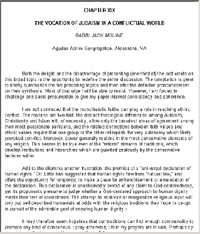
The Vocation of Judaism in a Conflictural World
Chapter XIX, Abrahamic Faiths, Ethnicity, and Ethnic Conflict
Cultural Heritage and Contemporary Change
Series 1. Culture and Values, Volume 7
February 16, 2000
© Rabbi Jack Moline
CHAPTER XIX
THE VOCATION OF JUDAISM IN A CONFLICTUAL WORLD
"Both the delight and the disadvantage of presenting (one-third of) the last words on this broad topic is the opportunity to redefine the entire discussion. The temptation is great to briefly summarize the five preceding topics and then offer the definitive pronouncement on their synthesis. Most of that urge I will be able to resist. However, I am forced to challenge one basic presumption to give my paper internal consistency and coherence."
"I am not convinced that the monotheistic faiths can play a role in resolving ethnic conflict. The reasons are two-fold: the distinct theological differences among Judaism, Christianity and Islam will, of necessity, allow only the broadest areas of agreement among their most passionate partisans, and the related distinctions between faith values and ethnic values require that one group or the other relinquish the very autonomy which likely provoked con-flict. Moreover, power generally resides in the most conservative elements of any religion. This seems to be true even of the "reform" streams of traditions, which develop institutions and hierarchies which are guarded zealously by the conservative factions within."
"Add to the dilemma another frustration: the premise of a "uni-versal declaration of human rights." Dr. Little has suggested that human rights flow from "natural law," and offers the opportunity for religion(s) to make a case for enfranchisement or emendation of the declaration. This declaration is unashamedly devoid of any claim to God-centeredness, yet its proponents presume to judge whether a God-centered approach to human dignity meets their test of correctness. The attempt to relativize or marginalize re-ligious input will only put self-described humanists at odds with the religious traditions they hope to co-opt in pursuit of the admirable goal of ensuring human dignity.1"
"It may therefore seem hopeless that our traditions can find enough commonality to promote any kind of consensus. I pray otherwise; I fear my prayers are in vain. Perhaps by examining a Jew's perspective my position will become clearer."